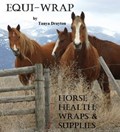Choose to be a better horseman…
Would you recognize a "silent" colic in your horse? Not all horses paw the ground and roll incessantly when they are colicky. Maybe the horse just seems a bit "off". What would you do?
4.6 Million "horse crazy" people have some sort of involvement in the equestrian industry…
Are you one of the few horsemen savvy enough to really know your horse inside and out? Would you be able to recognize subtle and severe breathing problems? Many horse owners are unacquainted with or unaware of basic normal values for their horses vital signs. Off the top of your head can you tell someone what your horse's normal heart rate, respiration, gum color, gut sounds, temperature or capillary refill time is? Could you place an effective pressure bandage on a severely bleeding wound to staunch the flow until veterinary help arrives?
Increase your education and knowledge base to go the extra mile for your horse...
Equi-Wrap – A Basic Guide to Equine Vital Sign "Normals", First Aid Supplies & Bandaging by Tanya Drayton also covers first aid kits, medications, poultices, bandages and bandaging and my personal experience with them. I give you my likes and dislikes, preferences and "wish" lists when it comes to what I carry on a trail ride with me to what I keep in the horse trailer and barn. It's set up in a table format for easy, quick reference to the information you need.
Impress your friends by knowing what to do in an emergency…
Has your horse ever been "not quite right" but you couldn't pinpoint the problem? Did it turn out to be more of an emergency than you originally thought when you called the vet? Use my experience, boiled down into a quick reference guide, to jump start your knowledge base. When your horse is acting "off", have a game plan of specific vital signs to check. Compare them to the "Normals" you'll have on hand because you used the "Noramls Chart" included in this manual. Be able to call the veterinarian with specific information about gut sounds, gum color, heart rate and more!
Become an active partner in your horses care!
Here is a chance to have a quick guide that gives you the information you need, fast. Is it really worth it? Risking your horse's health by not knowing?
Use this guide for a quick reference and swiftly improve communications between you and your vet when you're under pressure and need it most. Having this kind of information at the ready for your veterinarian when you call them can make the difference between them coming out right away or blowing you off until later. Or it could save you money, by reducing unnecessary veterinary visits, because the "now" and "normal" comparisons could give your vet enough information to instruct you on how to watch and wait, which in turn could possibly mean not needing them to come out that time.
Know your horse's normal vital signs and how to check them. Know what a healthy gum color looks and feels like. Improve your comfort level when applying bandages and wraps. ...learn about different salves, poultices, medications and when they could be useful.
No matter how long you've owned a horse, learning about these keys to horse health and knowing what to do with the information will dramatically improve your level of horsemanship.
This guide is for anyone who owns or works with horses. benefit from the knowledge in this manual. And for people that already know most of the information contained in this manual, it can be a valuable training tool for new employees or family members who suddenly are called to help out in caring for your horses when you can't.
What I can teach you will improve the quality of your equine partnership and take some of the mystery out of owning a horse. Use my knowledge and experience to your advantage. Don't wait, start learning more today!

